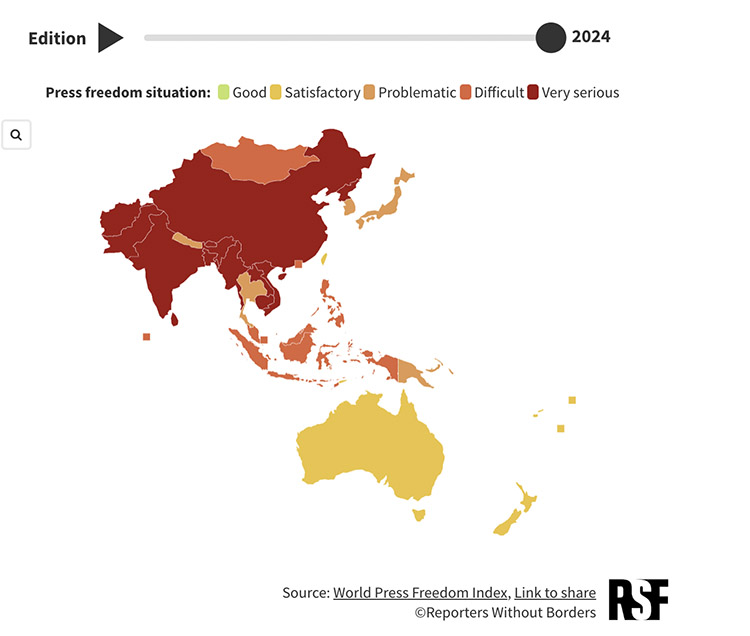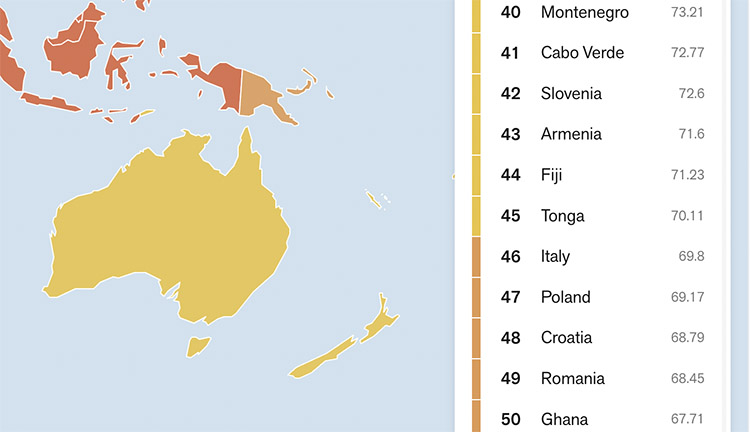
Press freedom around the world is being threatened by political authorities – the very people who should be its guarantors.
In marking Press Freedom Day, on 3 May, Reporters Without Borders says this is clear from the latest World Press Freedom Index https://rsf.org/en/index , which shows journalism is under political pressure.
Their finding was based on five indicators that were used to compile this year's ranking, and it showed that the political indicator has fallen most, registering a global average fall of 7.6.
The report said that States and other political forces are playing a decreasing role in protecting press freedom.
The Index rating this year shows that the press freedom situation has worsened in the Asia-Pacific region, where 26 of the 32 countries and territories have seen their scores fall.
No country in the Asia-Pacific region is among the top 15 this year.
This was chiefly due to a six-place fall by New Zealand (19th), which nonetheless retains its position as the region’s leader.
“Although experiencing challenges to the right to information, other regional democracies such as Timor-Leste (20th), Samoa (22nd) and Taiwan (27th) have also retained their roles as press freedom models,” says Reporters Without Borders.
Australia is in 39th place, a huge fall from last year, 27th.
Tonga slowly improving
This year Tonga is ranked in 45th position up from 49th in 2017, when it took a dive before the 2017 election, falling 12 places in the space of a year (from 37th ranking in 2016).
In 2017 Tonga’s press freedom rating was undermined by the re-election of the party of the late former Prime Minister Samieula ‘Akilisi Pōhiva. The country report on Tonga says that the legislative election of November 2017, was marked by mounting tensions with journalists, especially those of Tonga Broadcasting Commission where the top editors were sidelined under government pressure. There was a decision to deprive two senior public broadcasting journalists of all editorial responsibility, a government move to seize control of the state media two weeks before a general election. https://rsf.org/en/tonga-gags-state-broadcaster-two-weeks-election
Authorities appointed Tevita Tu’i Uata, an ally of Prime Minister Samuela ‘Akilisi Pōhiva, as the new chairman of the Tonga Broadcasting Commission (TBC), which oversees two state TV channels and two state radio stations. It was the new chairman who then sidelined TBC chief editor Laumanu Petelō and news manager Viola Ulakai, transferring them to the marketing and sales department. Their lawyer accused the government of “trying to control the media” ahead of the general election.
However, the report said that Siaosi Sovaleni’s election as prime minister in December 2021 was a new phase for Tongan journalists, who are awaiting concrete commitments that would allow them to work with complete independence.
The report states that over the past decade, Tonga has made progress on issues involving women’s rights and their role in and at the helm of the media.
Media landscape in Tonga
"Given how scattered the islands in this Pacific archipelago are, print media are virtually non-existent." However, the void has been filled by the state-owned Tonga Broadcasting Commission (TBC), which operates Television Tonga and Radio Tonga broadcasting under the slogan “Call of the Friendly Islands”. As for online news media, the landscape is dominated by Matangi Tonga and the New Zealand-based Kaniva Tonga.

Asia - Pacific
The report says that press freedom situation has worsened in the Asia-Pacific region, “where the region’s dictatorial governments have been tightening their hold over news and information with increasing vigour.”
With three journalists killed and at least 25 cases of journalists detained, Afghanistan (178th) dropped 26 places. North Korea (177th) and China (172nd).
Vietnam (174th) and Myanmar (171st) have pursued a policy of mass imprisonment of media personnel. They are the world’s fourth and second biggest jailers of journalists, respectively.
An increase in government reprisals against journalists has added Cambodia (151st) to the countries coloured dark red on the press freedom map because their situation is classified as “very serious.”
In 2023, two journalists were murdered in the Philippines (134th), which continues to be one of the region’s most dangerous countries for media professionals.
Worldwide
The overall decline in the political indicator has also affected the trio at the top of the World Press Freedom Index. Norway, still in first place, has seen a fall in its political score, and Ireland (8th), where politicians have subjected media outlets to judicial intimidation, has ceded its leading position in the European Union to Denmark (2nd), followed by Sweden (3rd).
“At the international level, this year is notable for a clear lack of political will on the part of the international community to enforce the principles of protection of journalists, especially UN Security Council Resolution 2222. The war in Gaza has been marked by a record number of violations against journalists and the media since October 2023. More than 100 Palestinian reporters have been killed by the Israel Defence Forces, including at least 22 in the course of their work.
“Occupied and under constant Israeli bombardment, Palestine is ranked 157th out of 180 countries and territories surveyed in the overall 2024 World Press Freedom Index, but it is ranked among the last 10 with regard to security for journalists (see the 2024 World Press Freedom Index security ranking).
Tonga fares very well on the security indicator this year, ranking 11th out of 179 countries. Samoa is ranked 3rd for security of journalists.




Comments
The Embassy is disappointed
The Embassy is disappointed by Matangi’s citation of the so-called “World Press Freedom Index” released by Reporters without Borders (RSF), which is a politically biased organization towards China.
The so-called “World Press Freedom Index” has unclear survey methods and data sources, and turns a blind eye to the progress and achievements in China, hence is neither fair nor professional. There is little, if any, credibility in their conclusions. In fact, freedom of speech is protected according to law in China, and the press and the public’s role of supervision is much encouraged.
Taiwan is one part of China, this is the prevailing consensus of the international community. The report refers to Taiwan as a "democracy" and lists it among other sovereign countries, which runs against the one-China principle, and is a clear violation of the norms of the international relations.
China and Tonga enjoy long-term friendly relations. It is particularly not appropriate for Matangi, a leading news website in Tonga, to cite such a report by RSF.